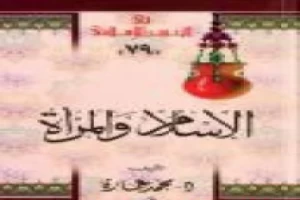Newly released
This book is new and will be uploaded as soon as it becomes available to us and if we secure the necessary publishing rights.

الإسلام والمرأة: في رأي الإمام محمد عبده Book PDF
(0)
Author:
Muhammad EmaraNumber Of Reads:
18
Language:
Arabic
Category:
ReligionsSection:
Pages:
132
Quality:
good
Views:
689
Quate
Review
Save
Share
Book Description
Muhammad Emara
Dr. Mohamed Ammar was born in Qalin Center - Kafr El-Sheikh, Egypt. And save the Qur'an and his presence in the book of the village. Dr. Muhammad Emara, an Islamic thinker, author, investigator, and member of the Islamic Research Academy at Al-Azhar, preserved the Qur’an and its existence in the village book. It began to bloom and grow national and Arab interests, a small. The first article published by him was the newspaper (Egypt Al-Fata) entitled (Jihad on Palestine). He studied a doctorate in Islamic sciences majoring in Islamic philosophy - College of Dar Al Uloom - Cairo University in 1975. Masters in Islamic sciences majoring in Islamic philosophy - College of Dar Al Uloom - Cairo University in 1970 and a BA in Arabic language and Islamic sciences - College of Dar Al Uloom - Cairo University 1965 AD. He investigated the most prominent figures of the modern Islamic intellectual awakening, Jamal al-Din al-Afghani, Muhammad Abdo, and Abd al-Rahman al-Kawakibi, and authored books and studies on the flags of Islamic renewal, such as: Dr. Qutb, Hassan Al-Banna, and among the prominent companions of the Prophet, Ali bin Abi Talib. He also wrote about the currents of ancient and modern Islamic thought and about heritage figures such as Ghaylan Al-Dimashqi, and Al-Hasan Al-Basri. Among his last writings on modern thought: Religious Discourse between Islamic Renewal and American Change, and the West and Islam Where is the error... and where is the truth? And articles of religious and non-religious extremism, Islamic law and Western secularism, the book Our Future between Islamic Renewal and Western Modernity, the crisis of modern Islamic thought, intellectual creativity and cultural privacy, and many others. He has contributed to many specialized intellectual periodicals, participated in many seminars and scientific conferences, and was a member of a number of intellectual and research institutions, including the Supreme Council for Islamic Affairs and the Higher Institute of Islamic Thought. The writings and research of Dr. Emara, which enriched the Arab library, which amounted to (200) authors, were characterized by innovative and revival points of view, and to contribute to intellectual problems, and to try to present a civilized renaissance project for the Arab and Islamic nation in the stage in which it lives. He received many awards, honors, certificates of appreciation and shields, including the Friends of the Book Association award in Lebanon in 1972, the State Encouragement Award in Egypt in 1976, and the Order of the Islamic Intellectual Trend, the Founding Leader in 1998.
Book Currently Unavailable
This book is currently unavailable for publication. We obtained it under a Creative Commons license, but the author or publisher has not granted permission to publish it.
Rate Now
5 Stars
4 Stars
3 Stars
2 Stars
1 Stars
الإسلام والمرأة: في رأي الإمام محمد عبده Quotes
Top Rated
Latest
Quate
Be the first to leave a quote and earn 10 points
instead of 3
Comments
Be the first to leave a comment and earn 5 points
instead of 3